A.Y.2022-23
A Session on Challenges in implementing CSR initiatives during COVID 19
Ms. Straddha started off with a video clip on CSR made by UNICEF and briefly explained the
triple bottom line concept and circular flow CSR models. She gave an overview of implementation of
CSR by TCE and its focus on livelihood generation and promotion of sustainable ways of living. She
shared her experiences of strategies used to handle CSR and the related challenges during the on
going COVID pandemic. The Company has proactively shifted its CSR focus to organizing modular
and collapsible hospitals, provision of Ventilators, Oxygen, COVID kits for hospital staff along with
other activities like designing nutrition programs and e-education for the masses
A session on Applications of Best Practices in Organizational Development
Mr. Jaswanth spoke about Models for Managing Strategic Plans such as Top-down, Transformational and Strategic approaches and Organizational Development Interventions such as integrated strategic change, trans-organization development, mergers acquisitions, culture change, self-designing organization etc.; Techno-Structural Interventions with structural design, downsizing, reengineering, employment involvement, work design etc.; HRM Interventions with goal setting, performance appraisal, reward system, career planning and development, coaching and counseling activities, managing work force diversity, employment wellness etc.; and Human Process Interventions with process consultation, intergroup activities, team building, organization confrontation meeting, etc. With the help of a case study, he explained how organizational cultural values impact OD interventions. He urged students to improve their tangible and intangible skills such as Mastering communication skills- ; Mastering Excel- Ability to create dashboards, and conveying the ideas in a visually impressive manner; and Time management. The students had an opportunity to learn about the best practices to the organizational development.
Managing Cultural Diversity in Professional Space
Mrs. Pragati Chopra Shah, spoke about her experience dealing with cultural diversity in a workplace during her career as an HR professional. Began her session by asking the attendants about their understanding of the terms, culture, diversity, profession and workplaces. She opined that Millennials are influencing workplaces now and in the future as such as redefining the term cultural diversity – the presence of several ethnic or cultural groups within a society. It’s a trend that will undoubtedly endure the coming tests of time, societal changes at global levels. We all are moving towards being considered as aa population that is inclusive of all differences. Race, ethnicity, age, ability, language, nationality, socioeconomic status, gender, religion, or sexual orientation are examples of workplace diversity from a business perspective.
She further discussed the various forms of diversity in the HR industry. There are a few key types of diversity characteristics that HR should consider – Age, LGBTQIA, gender, differently abled, mindfulness neurodiversity, thought process to name a few.
The class concluded with a fruitful round of questions and answers because most of the students wanted to express their opinions and get any questions they had about cultural diversity in the workplace answered, which the Guest speaker gracefully obliged.
A.Y.2020-21
Financial Frauds & Corporate Governance
CMA Harshad Deshpande, Ex-Chairman – WIRC of ICAI, Insolvency Professional, Registered Valuer, explained about concept of corporate governance and its importance to companies.
The case of ICICI Bank – Videocon was discussed wherein he emphasized on misuse of position by the directors. It was also discussed that this being a Related Party Transactions [RPT] it should have been dealt with utmost care and caution. In such situations the role played by independent directors in discharging their duties with due diligence plays an important role. They can demand requisite information from the company to arrive at correct decisions and if they are not satisfied, they can record their dissent. This is crucial as in the unfortunate event of foul play in such RPTs, independent directors can be held accountable.
Interview Skills
Ms. Rutuja Parkhi, student of MBA – II, who has received the PPO from Sage Automation Pvt Ltd was invited to deliver a talk on ‘Interview Skills’. Her primary task at the company is Talent Acquisition. Keeping this in mind, she dwelled on the following:
- Avenues open to the students in the filed of HR – HR Analytics, Recruiting, Talent Acquisition, etc.
- Common questions asked during interviews and the points to be kept in mind while answering such questions.
- She explained that during interviews many persons get carried away and boast of skills that they do not possess – as a result of which they fail. She emphasized that the CV/Resume is key to securing the coveted interview call.
- She encouraged the audience to participate in events, seminars, etc. Organized by the Insititute – because this will help one to overcome their fears and be confident while facing the corporate world.
Career Opportunities in Marketing
Mr. Yogesh Tithe. Founder & CEO, Entie, spoke about his own MBA journey, which made the discussion incredibly illuminating and inspiring. His talk and insights offered a new direction, and a sense of ambition in the students. He detailed out multiple avenues available in the marketing industry, how he started his start up journey, the importance of forming networks and choosing the right specialisation while pursuing an MBA programme. He used a short video showcasing the teachings of Buddha which emphasises on staying focused on one’s goal and reaching the final destination. Mr. Tithe advised that one should stay put in a job and be confident about skills acquired. Staying focused and consistent is guaranteed to give one success He ended his talk with a video about advertisements and an offer of internship and placements.
Career Opportunities in Finance
CA Prem Bhateja, Analyst, UBS explained about the Career Opportunities in the field of finance. He gave us an insight of various streams that a financial student can opt for in the banking field. Besides this, he also dwelled upon the options and skills set needed for –Analyst, Core Finance amongst others.
He informed the students that if one wants to excel in finance domain the basic fundamental knowledge of accountancy is essential, as in the first interview questions related to it are asked.
This was followed by QA round wherein students asked about:
What it takes to be a financial analyst? – He replied that one must have domain knowledge, be abreast of latest developments in the filed of finance by reading newspapers like The Economic Times, The Financial Express, etc.
Is it true that Big4 offers roles to only CAs? – He replied that a person with excellent financial knowledge would be having the edge – be it a CA, CMA or MBA – Finance.
Workshop on Capital Markets (NISM-SEBI)
A three-day workshop was organized by Kotak Securities under its CSR initiative in association with NISM (National Institute of Securities Markets) on Financial education for young citizens. He covered topics such as Importance of Investment , Financial Investment Opportunities , Process & Pre- requisites to invest in Securities Markets ,Investment in Primary Markets , Investing in Secondary Markets , Introduction to Mutual funds and ways to invest in them , Precautions while investing in Securities Markets ,Career in Securities Markets with practical examples of Kotak securities. He gave the following useful tips on savings:
- Savings are not done once; save regularly
- Spend less to save more; record your expenses
- Save to avoid debt
- Save and invest first and spend later
- Classify Expenses in Need and Want
Further, he explained points to remember for new investor:
- Read all documents in KYC carefully before signing.
- Select the Segment and Stock Exchange on which you wish to trade by affixing your signature instead of a Tick mark or YES. Strike off whichever is not opted.
- Sign on the Tariff Sheet.
- Select / Unselect Online Trading Option.
- Power of Attorney (PoA) should only be given to access your accounts to the extent of the obligation. No POA to be given to trade on your behalf.
- Policies, Procedures, Brokerage Rates, Other Charges vary for every Stock Broker.
- Investors have to sign only on one document while opening any account and are supposed to submit KYC documents only once.
- Give your own email id/mobile number while submitting the KYC documents.
- Please remember that no one can guarantee assured returns in the securities market.
The students, faculty, and staff took positive key takeaways from the workshop, especially the women faculty, with the hope of planning their finances better.
Worshop on Google Apps: Useful Tools for Librarian and Research Scholars
Mr. Bachhav stated the features of Google Chrome in detail as well as Google apps such as Maps, Drive, Keep, Blogger, Hangouts, Jamboard, Earth, Arts and Culture. He explained how to organize Gmail by using different folders; how to create YouTube channel using Gmail account in detail. He demonstrated the Keep app, Google Workplace and search strategies in Google. He provided guidance on creating sites on Google and gave information on how to search and purchase domain for the sites. Mr. Bachhav also explained how one can use the attributes of Google Scholar in a specific way..
Introduction to Zotero
Dr. Pujar stated that for research one needs to record different kinds of secondary sources of data that one refers to and suitably cite them.. Zotero helps in systematically recording these data sources. Dr. Pujar introduced Zotero features and provided guidance on steps of downloading Zotero iZotero icons for recording books, Zotero list of item box and Zotero icon for collection of items. He demonstrated how to create new manual item and new item from current webpage; how to save link to current page; how to take snapshots of current page; how to create new standalone note; look out items such as DOI, ISBN and search items; how to create bibliography using APA or Chicago or MLA or other citation styles. He enlightened participants about Zotero MS-Word integration; Zotero online syncing; Back-up data; and Zotero-retracted items notifications
Research Skills by using Grammarly & Typeset Research Studio
Mr. Zeeshan explained in detail features of both the softwares/ tools for citing, formatting and building research work. He demonstrated how the software can be used to search journals/articles; converting MS-Word document into PDF; formatting of references in the research paper and making citations. He provided guidance for getting documents reviewed independently in Typeset Studio and explained how to select templates for articles; how to add equations, references, figures and tables using Typeset Studio. He also demonstrated the use of tools for checking plagiarism in both the softwares. Mr. Zeeshaan showed how we can set goals such as formatting, domain, tone, intent, etc.and how Grammarly can be used to correct language errors.
The Art of Living Covid Care Program For Institutions
SVIMS and SPPU jointly organized a three days Art of Living Online Covid Care – Immunity Boosting programme. The programme was meant to boost immunity, improve lung capacity, mental health and reduce stress and anxiety through meditation, breathing and yoga for non-Covid, Covid positive with mild or moderate symptoms and post Covid persons. The three-day programme started on June 24 and concluded on 26 July between 6 PM to 7 PM.
Art of Living Pune Chapter’s team of Trainers – Ms Rajashree Modak, Mr Parag Kulkarni, Mr Rohit Patil trained our students and staff on Yoga, meditation and breathing techniques as effective tools to fight against the physical and mental distress brought by the pandemic. These techniques are claimed to boost immunity and aid in the mental and emotional recovery of Covid-19 patients and others. The relaxation brought by these techniques also aids the healing process.
On the last day, Dr B H Nanwani, Director, SVIMS concluded the session by expressing gratitude for the conduct of the programe and shared her experience of the three-day event.
Workshop on CV building and LinkedIn profile development cum Virtual campus drive.
Organised by The Placement Committee.
This virtual campus drive and a training programme was arranged for our students in partnership with Wocially. Mr Prashant, the trainer for the session and Strategic Business Partner at Wocially conducted this drive in the following manner:
- Explained students, the process of registering on Wocially for they can then be put in touch with 100+ prospective employers for internship and job opportunities
- Shared his insights and learnings on building and maintaining a LinkedIn profile for building a fruitful network on the platform
- Discussed and trained the students on commonly asked personal interview questions
Through this partnership with Wocially, we thus conducted a virtual campus drive to put our students in touch with 100+ employers.
Online Workshop on Applying for Research Grant
30.03.2023
Prof. D. Vishnumurty, Dean Aditya Institute of Technology and Management and Chief Coordinator of ED cell and Business Incubation Center was the resource person for the workshop.
First, he shared his views on the current management research. He said that contemporary management research played an important role in businesses and business growth. In the second part of his lecture, he elaborated on the various governmental funding agencies like AICTE, UGC, EDII, DST and non-governmental bodies like Skill Development Corporation of India and State Departments. He described various available schemes of the governmental and non-governmental bodies, where Management Faculty can apply for funding. He explained about grants for faculty Training, Quality Improvement program, Research Promotion, Idea Lab, Conferences, Major and Minor Research Projects.
The next part of his session dealt with writing research proposals. He emphasized that focus should be on a clear objective, relevance of the outcome, a well-defined timeline and detailed budget with justification wherever required. He further explained the importance of a research eco-system in an Institute with internet and library resources like journals and e-resources available for research purpose, affiliation or membership to bodies like AIMA and mentors for research study guidance. He mentioned that Institutes applying for Grants need to be listed under UGC 2 (f) 12(B).
He explained the process of application for the funds. He mentioned that the processes and funding availability are mentioned on the websites of various funding agencies. He concluded by reiterating ethics in research.
Workshop on case Writing

Mr. Ketan Gandhi an alumnus of IIMA, Founder of KgGuruji and a Consultant to businesses facilitated the workshop on case writing. The workshop was conducted on two days: 15th April and 20th May 2023. The gap of almost a month was given to the faculty members to develop their own cases and teaching notes.
In the first session Mr Ketan Gandhi explained what cases are and their importance as a teaching aid. He also explained that case study methodology is an interactive method of teaching which involves teamwork and exchange of ideas and thoughts amongst the participants. This helps the participants to look at a particular topic or problem from various perspectives. He also guided the faculty members on how to write a case. He explained that writing a case study involves deciding a topic for the case, researching on the topic, collecting material for case writing, and then developing the case. He said that cases should have a very attractive title and writing style which would attract the attention of the readers/ students and motivate them to read and solve the case. He explained various important points like, case writing types, use of story telling in case writing, having a protagonist in the cases, etc o make the cases interesting to read and solve.
After the first session there was a gap of about a month for the faculty members so that they could write a case and teaching note. During tis time they could interact with Ketan sir. Ketan sir gave his feedback on the cases written by faculty members and helped them shape their cases.
The second session conducted on 20t May 2023 focused on the reflection of the faculty members on their case writing journey. Faculty members shared their experiences like satisfaction level increasing, difficulty in getting material, challenges of choosing a topic and many more. Further Ketan Sir explained in detail about finalizing the cases and developing a teaching note. He also explained the various requirements of publishing the cases. He mentioned many sites like Case Center, IIMs, Journals etc. where faculty members could publish their cases. After a brief Q & A and Thank you note the workshop was concluded.
Conclusion for the Worshop – as a part of and conclusion of the workshop, each faculty members had to write, get the case reviewed by Mr Ketan Gandhi and submit cases. These submitted cases would be published. Four cases are submitted till now.
Training on Lecture Capture System ( Impartus )
13 October 2022
Staff Development Programme Use of Interactive Panel
31st December 2022
As educational institutions around the world embark on the journey of digital transformation, adding an interactive flat panel in the classroom gives us an edge over institutions who are still using the traditional teaching methods. Interactive flat panels are smart tech devices that replace the traditional chalkboard or whiteboard. They can be used to enhance the educational experience for both students and teachers. SVIMS incurred a CAPEX by acquiring 86 inch Interactive Panel from Promethean World Ltd.
It was conducted by Mr. Sanjeev Devnani, General Manager, Almoe Digital Solutions Pvt Ltd. He demonstrated the use of Whiteboard, Annotation, splitting the screen into two (one for sharing the pdf of the textbook and the other for sharing audio and video content/Whiteboard, etc), saving the teaching content to create a library resource, amongst others. Most of the teaching tools explained by him were helpful with an ease of use for all the subjects for the teaching-learning process.

Table service etiquettes
18 June 2022
An interactive Staff Development programme on ‘Table service etiquettes’ was held on 18th June 2022 for Teaching, Admin and Support staff. It was organized in collaboration with Suryadatta group of Institute’s Hotel Management; the session was conducted by Mr Pratik Satpute.
The workshop commenced by the speaker informing the staff about the importance of the first 40 seconds of one’s body language as that leaves a lasting impression on the minds of guests. He also demonstrated the various types of greetings. He explained to the staff about the various courses in a continental meal namely starter / appetizer, soup, pasta /rice, salad, main course and finally the dessert along with the sequence of serving the food.
He labelled the tableware namely the cutlery, crockery, glassware, and tissue paper. He also explained about the silver ware, used in the food industry.
The speaker shared guidelines on dining serving etiquette, including the décor used during dining. Further, he explained the service type – Pre plated Service and Table service. Rules for preparing table – Forks always go to the left, while water glass and spoons are on the right. While serving always serve from right side of the guest, how to prepare a service plate, how to serve using tongs or fork & spoon, how to clear the table before serving dessert, etc.
A practical session of food serving followed, wherein staff had a hands-on experience of demonstrating what they had learnt in the session.
STAFF DEVELOPMENT PROGRAM ‘TRAINING SESSION ON MOODLE’
Moodle is a free and open-source learning management system used for blended learning, distance education, flipped classroom and other online learning projects. Given the need to enhance the teaching learning processes, a Training session was conducted by Mr. Hanifkha Pathan, Consultant, Index Infotech, Pune.
Mr. Pathan covered the necessary aspects of incorporating Moodle into our existing academic practices to ensure smoother and transparent functioning. It shall also support easy access of teaching learning material wherein the students would be able to access session materials incase they miss out on any session.
Mr. Pathan also showed the tools to make sessions more interesting such as Quiz, Video tags etc.
The staff members asked questions related to the same and actively participated in the session.
Dr. Divya Lakhani, HOD, gave the Vote of Thanks

Staff Development Programme – Fire Fighting Training
29th October 2022
The purpose of the firefighting training is to give participants skills, knowledge and expertise that will enable them to identify the conditions capable of causing fire, know how to use a fire extinguisher, respond appropriately to fire emergencies and follow the fire evacuation plan, adequately implement fire emergency procedures. It was conducted by Mr. Vijay Bhilare, Station Duty Officer of Dayaram Rajguru Fire Station, Kennedy Road, Pune and his team.

Professional Etiquette at workplace
Mr Chetan Bharadia, freelance trainer,
Friday, 19th November 2021
SVIMS organized Staff development program on Professional Etiquette at workplace by Mr Chetan Bharadia.
· Mr Chetan Bharadia, freelance trainer, welcomed all the staff for training program.
Emphasizing the importance of the program, he spoke about the need to improve professional etiquette as they have a positive impact on personal and institutional behaviour. It is important to build an attitude that is empathetic of others’ needs and feelings. This behavior leads to good manners and common courtesy, thereby improving your etiquette.
He also spoke about the courteous behavior that includes:
· Using please and thank you as appropriate
· Addressing others using Mr., Mrs., Miss, or Ms. unless otherwise requested
· Speaking clearly and distinctly while using a pleasant tone of voice
· Maintaining eye contact
· Smiling and offering a firm handshake when meeting someone new
· Writing thank-you notes and letters of appreciation, congratulation, and condolence as appropriate
He also spoke separately with teaching staff about the research papers, writing emails etc, with admin staff telephone calls, face to face speaking, handling students’ grievances and requirements, with office support staff regarding greeting, eye contact, service skill (asking and serving water, tea, snacks, etc).
The training program concluded with a vote of thanks by Ms. Sonali Joshi to all the attendees

Induction program of Indian Red Cross Society, Pune at SVIMS
Recourse Person – Dr Dilip Pardeshi (Secretary) and Ms Bharti Kamble (Coordinator)
Dr. Abhijeet Kaiwade, HOD, SVIMS welcomed the guests and the attendees for the program. The program commenced with lighting of the lamp followed by welcome address of Dr B H Nanwani, Director SVIMS.
Dr. Dilip Pardeshi explained the role and history of Red Cross Society and the activities held by Indian Red Cross Society, Pune chapter. Dr. Pardeshi welcomed SVIMS students volunteer into Indian Red Cross Society Pune chapter. Indian Red Cross Society has been designed to involve young people as much as possible in the movement of betterment of our society and its activities not only as workers and as beneficiaries, but as partners in management.
The Junior / Youth Red Cross programme focus on the following areas:
- Promoting life and health through training and education on safety, primary health care and healthy living
- Encouraging community service through training and education
- Disseminating the seven fundamental principles of Red Cross and Red Crescent movement through activities that encourage the Red Cross ideals
- Promoting international friendship with activities that cultivate a humanitarian spirit
- Technical support in the development of youth programs, fund-raising, identification of material and human resources
Dr. Pardeshi addressed the students and staff about Youth Red Cross (YRC) which is a voluntary service body of Indian Red Cross Society which supports Humanitarian services to the fellow human being in Health-related services to the community through voluntary service. YRC also provides training to develop leadership quality and overall personality improvement of the students by organizing and participating in the activities of YRC.
Some of the activities of YRC are as follows:-
- Blood Donation Camps
- Orphanage Visits
- Tobacco, Anti-Smoking and Drug Abuse Lectures
- Health Screening Camps
- First Aid Training programmes
- Environment awareness camps
- Clean and green in our campus
- Other Voluntary / Social Service Activities and more related program depending on the need and requirement for the community.
Participation -39 attendees
- Physically present in the Seminar room – 14 (5 Teaching staff, 5 Non-teaching staff and 4 students)
- Online participation 24 students and 1 teaching staff
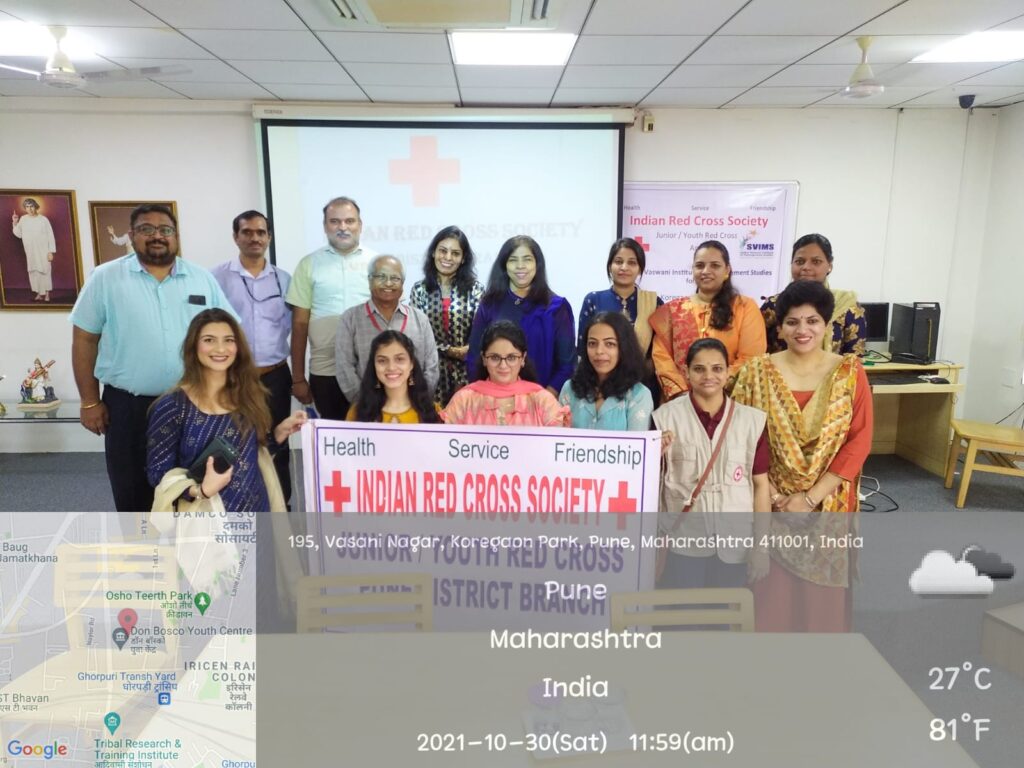
FIRE DRILL TRAINING SESSION (FOR NON TEACHING STAFF)
26 November 2021
Mr. Vijay Bhilari, Station Duty Officer, Naidu Fire Brigade, along with two of his associates – Mr. Vijay Choure and Mr. Bhalchandra Gavhankar, had conducted the session on Fire Drill.
The major aspects of the session were related to:
– dousing of fire with water and a wet cloth
– how to use a fire extinguisher
– the correct way of evacuating a building
– how to help people who are sub – conscious to evacuate a building
Mr. Naidu also emphasized on the importance of reviewing disaster management practices every year or periodically as it helps an organization to understand the lacunae and take timely corrective measures/actions.
The Non-teaching members were also made to participate in simulated situations.
The officers patiently answered the queries that were being posed by the attendees. SVIMS also invited nursing students, faculty and staff from Sadhu Vaswani Nursing College.
SVIMS team was thankful to them for taking their time to train the employees in a much important aspect of maintaining safety at the Institute.

Fire safety training
28 October 2021
Mr Nazim Deshmukh
Fire Auditor, Rapid City Sales and services, Pune
Participants 14
Mr Nazim Deshmukh trained us on fire safety and explained that Fire is a self-sustaining, chemical chain reaction with varying degrees of light and heat. Fire is made up of four components Fuel, Oxygen, Heat and Chemical Chain Reaction. He explained that upon noticing a fire resort to the 3 A’s – Activate, Assist and Attempt.
Attempt to fight a fire only after the first two steps have been completed and upon gaining confidence. He advised that one’s back should always be against some exit mechanism so as to escape when the need arises. Never attempt to fight a fire if there is a heavy smoke condition. Smoke can be extremely toxic and will reduce your visibility. Only fight small fires, no larger than the size of a small waste basket. Small fires will grow big very fast. Employees should take the time to learn the nearby locations of the fire extinguishers in their workplace.
Fire Extinguisher Use – Use the acronym PASS to remember how to use a fire extinguisher.
P – Pull
A – Aim
S – Squeeze
S – Sweep
He also demonstrated the use of fire extinguishers in a real small fire situation.
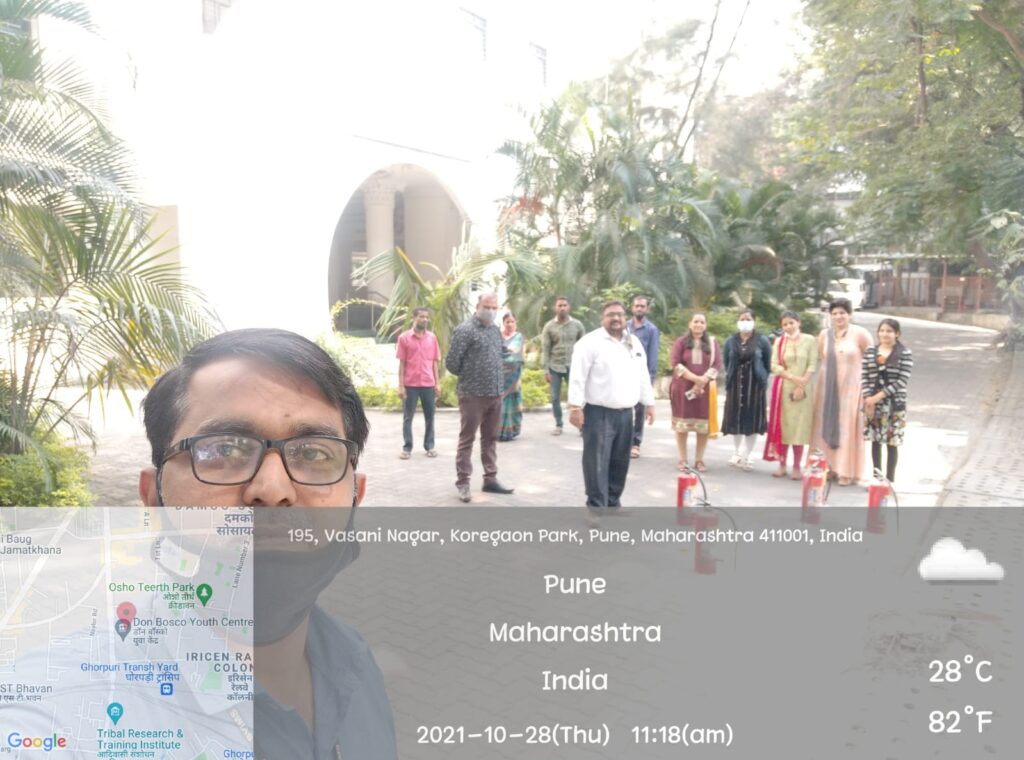
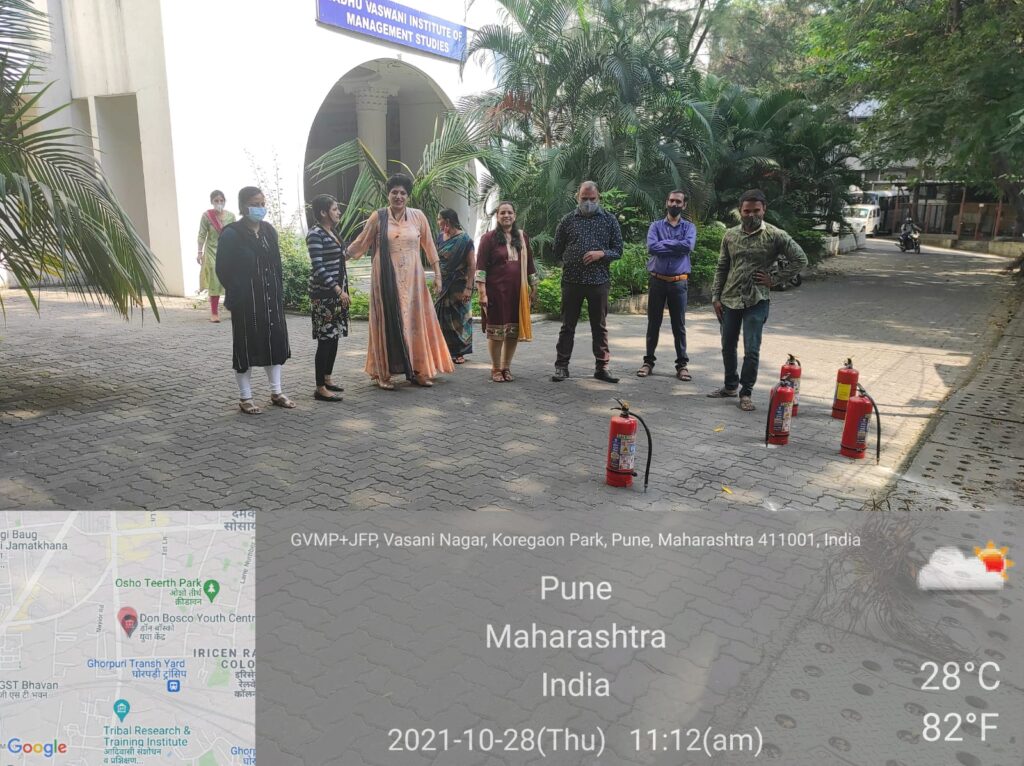
Insurance and NPS: Security for your future (Staff Welfare Program)
Date: 15th June, 2021
Speaker:
Mr. Suresh Gaikwad Manager (ADM cadre) Chief Life Insurance Adviser
Mr. GokulRaykar, Director of G.B. Raykar& Co.
Mr. JafarAnasri, Unit Manager (NJ India Pvt. Ltd.)
Topic: Insurance and NPS: Security for your future (Staff Welfare Program)
Mr. Gaikwad and Raykar started their session by explaining various types of insurance policies and importance of insurance in an individual’s life. Further, both of them illustrated how an individual’s insurance value is derived with few examples. Both the speakers stressed on below points that one should consider before purchasing an Insurance policy:
1. Objective of buying an Insurance policy
2. Terms and conditions of the policy
3. Financial Budget for purchasing policy
4. Insurance coverage one requires.
5. Reputation and image of the insurance company
While, Mr. Jafar briefed the participants on NPS (National Pension System) introduced by the Central Government for citizens of India between the ages of 18 and 65. He also explained how NPS is helpful to an individual to create a retirement fund and thus secure their retirement.
All the speakers highlighted the importance of early investment to get benefits in future.
17th Dec. 2018
Resource Person: Dr. Rani George
Global Competence: Teaching 21st Century Students
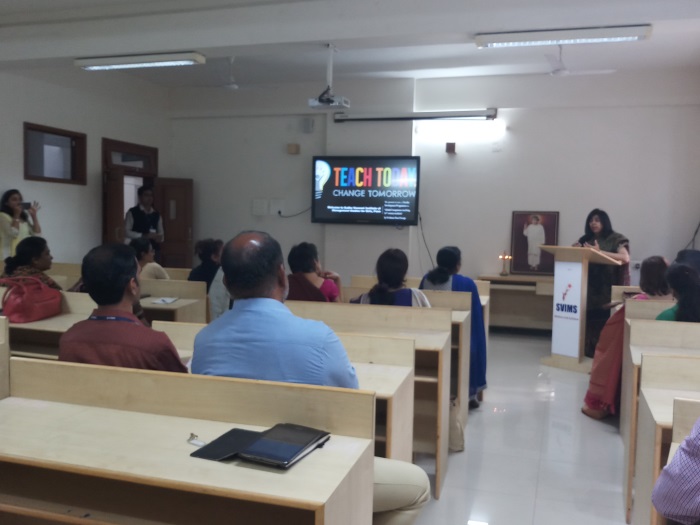
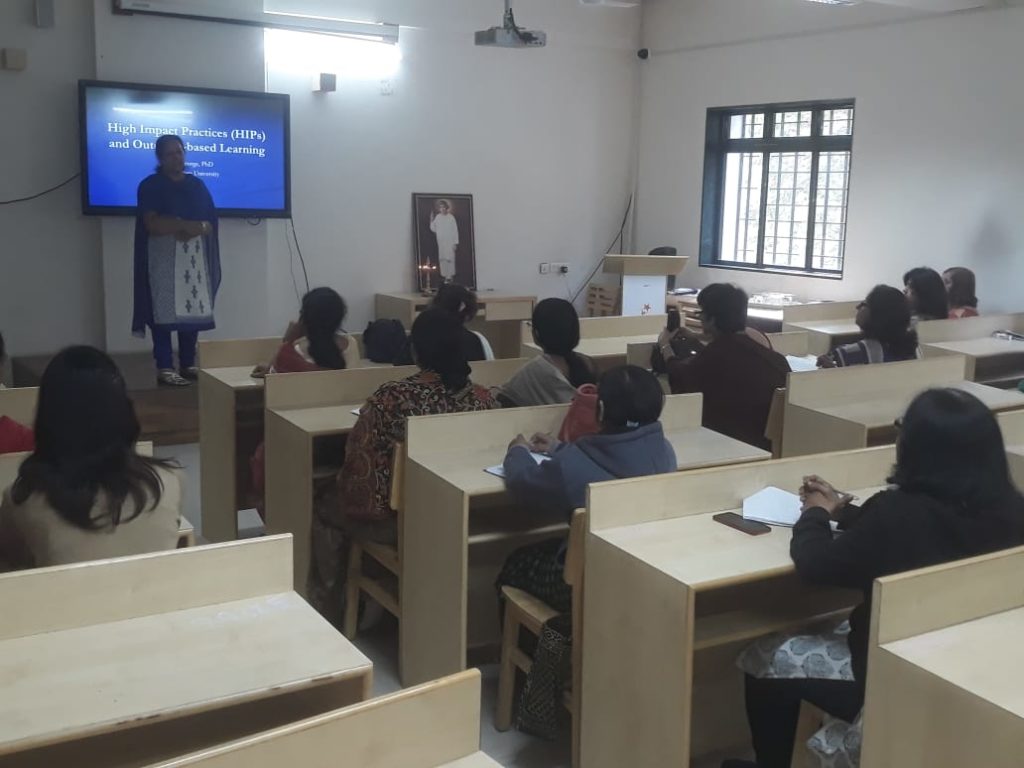
An FDP was organized to help faculty adopt the High Impact Educational Practices and prepare the students to be globally competent. Dr. Rani George Dean of College of Arts & Humanities at Albany State University explained the various high impact educational practices that will help the teachers to engage the students and make them competent. She started with outcome based learning covering terms like Engagement Indicators, Learning Strategies, Reflective & Integrative Learning.
She made it simple to understand with various live examples.
24th February 2018
Resource Persons: Dr. Vikas Shinde
Understanding the Program and Course Outcomes.
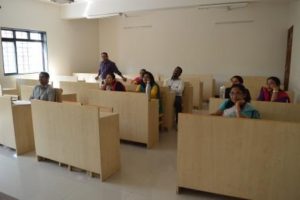
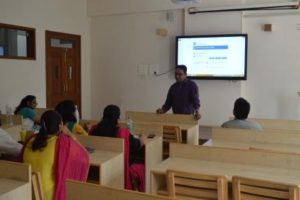
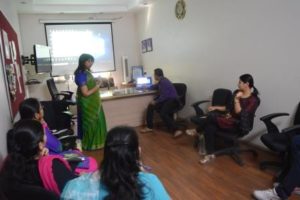
An FDP was organised to help faculty adopt student centric pedagogy and learn to design and measure course and programme outcomes. Dr. Vikas Shinde, Director, Center of Excellence Project Based Learning, explained that for higher education courses, one should aim for imparting ‘higher order thinking skills’ as desired outcomes. These are based on Bloom’s taxonomy.
Through illustrative examples he explained how Course outcomes can be co related with Program outcomes and further the ‘rubric’ to measure course and programme outcomes.
15th January 2018
Resource Persons: Dr. Anuradha Mathrani, Dr. Sanjay Mathrani
Effective Pedagogy (Research, Innovative Pedagogy & Industry Academic Practices)
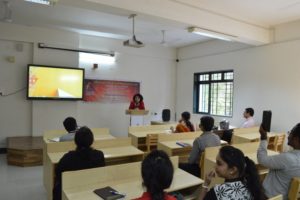
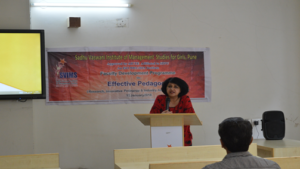
Dr. Anuradha Mathrani, Sr. Lecturer. Institute of Natural and Mathematical Sciences, Massey University and Dr. Sanjay Mathrani, Sr. Lecturer, Product Development, School of Engineering and Advanced Technology, Massey University stressed on the inclusion of technology, participative learning and research oriented teaching as effective tools for enhancing the overall teaching- learning experience and making it more effective for the takers.
30th Jan to 5th Feb. 2017
Resource Persons: Mr. Gaurav, Mr. Anil Gupte, Swami Siddheshanand]
Effective Educational Leaders –II [Technology in Teaching – Learning Processes]
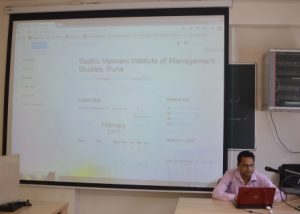
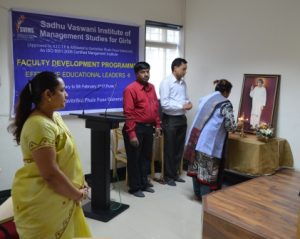
A seven day workshop on ‘Effective Educational Leaders – II’ was conducted from 30th Jan to 5th Feb, 2017 at SVIMS with an aim to enhance pedagogical skills of faculty members by using technology in the teaching – learning processes. Technology is going to play an increasingly important role in education sector. A large number of academic institutes all across the globe have adopted Learning Management Systems like Moodle.
Day1
In his opening session, Mr. Gaurav stressed upon the need to adopt and adapt to technology. An overview of many softwares and their numerous features was presented by him. He stressed on the need to use open source programmes and are user friendly. The day concluded with a demo on installation process of Moodle.
Day2
The topics of discussion on day two of FDP were user management, course management, registration and enrolment of students. Each process was demonstrated by the resource person in ‘a hands on manner’. Site administration and control process were also explained. The rights of each registered user of Moodle are defined according to the role, and this is an inbuilt feature in the system.
Day3
The third day of FDP commenced with discussion of customization features which can be integrated in Moodle. Moodle plugins, as they are commonly referred to as, can be installed to make Moodle meet specific requirements of the organisation. These plugins are available freely on Net and are user friendly with graphic interface. One distinguishing feature of Moodle is the integration of tests and assignments. Using Notepad 2 version, online tests can be created and installed in Moodle which can be accessed by students and attempted in the allocated time.
Day 4
The fourth day was devoted to discussing integration of payment gateways into Moodle. He also cautioned the participants of security breaches and vulnerability of such system and preventive measures. Video conference is one of the tools which can be used to enhance the teaching learning effectiveness. The participants were familiarised with use of and integration of this feature with Moodle. Virtual classroom can be created using this platform where two way live chat can be generated. The session ended with a demo on certificate creation and customisation for programs held in the institute.
Day 5
This day began with introduction to Content Management System (CMS). Mr. Gaurav explained the difference between CMS and LMS. Many free and open source CMS are available, like Joomla, which are user friendly and can be adopted without any software knowledge. Research plays an important part in efficacy of any academic program. Use of softwares like Mendeley, not only makes the process quicker but also comprehensive. Mr. Gaurav Kumar also gave a demonstration on open conference system (OCS) and open journal system (OJS)
Day 6
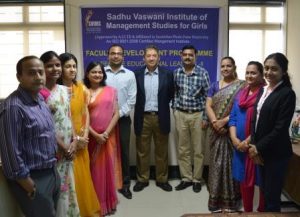
Mr. Anil Gupte, Founder Layer 3 Media, presented the concept of Blended learning to the participants and showed how it can be implemented in the classrooms. He explained that adopting technology is no longer an option. . IT enabled teachers are a basic survival mechanism for any academic institute. He also gave strategies which can be adopted by faculties to be prepared for the inevitable future. According to Mr. Gupte, preparing and maintaining database in a systematic way is the first step towards adopting technology.
Day 7
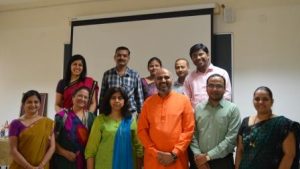
Following the tradition of SVIMS where values and spirituality are embedded in day to day activities, the seventh day of FDP was set aside for a session on inculcating values in pedagogy. Swami Siddheshananda from Chinmayanand Mission, Pune, was the apt choice for the resource person on this topic. He gave insights into the working and thinking patterns peoples’ minds. Throughout his discussion he laid emphasis on the need to have a stable mind if any learning or growth has to happen. The session ended with realisation that the best education a teacher can give to a student is value-based education.
1st Dec to 7th Dec. 2015
Resource Persons: Mr. Anil Dagia, Mr. Jitendra, Mr. Anil Gupte, Swami Siddeshanand, Mr. Rai]
Effective Educational Leaders [NLP, Multiple Intelligences, mind Maps, TQM, Value Based Education]
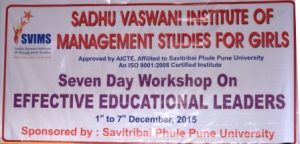
A seven day workshop was conducted from 1st Dec to 7th Dec, 2015 for faculty across schools and colleges with an aim to enhance their pedagogical efforts, psychological influence on students and making them effective mentors and social integrators. The FDP on Effective Educational Leaders brought together participants from Institutions in Pune, other Universities of Maharashtra as well as from Hyderabad and Ahmedabad.
Day1-3: NLP and Emotional Fitness Gym
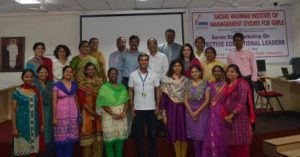
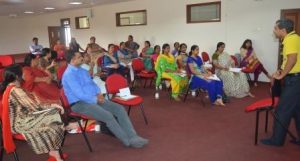
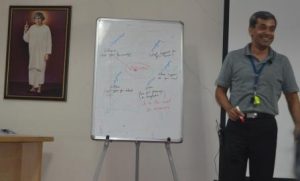
The First Session on NLP was ably conducted by Mr. Anil Dagia, one of the foremost NLP and Emotional Fitness trainers in India. In a highly interactive 3 day session, Mr. Dagia took the participants through Changing Negative Thought Patterns, Understanding Student Types and also an Emotional Fitness Training.
Day 4-5: Multiple Intelligences
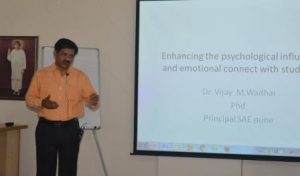
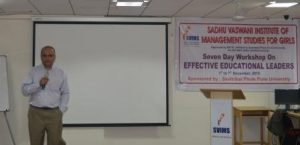
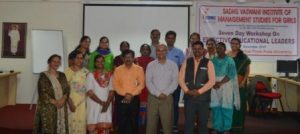
Mr. Jitendra Sandhu, COO TalentMat, conducted a two day session on multiple intelligence and its role in enhancing the “learning teaching experience”. He spoke about the eight different intelligence types present in all humans in varying proportions .Mr. Sandhu also stressed the need to develop skills sets amongst students that are linked to the type of intelligences which they majorly possess In order to enhance the effectiveness of pedagogy.
Day 6- Mind Maps
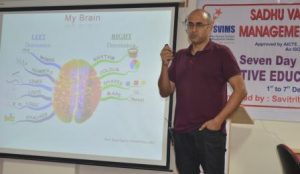
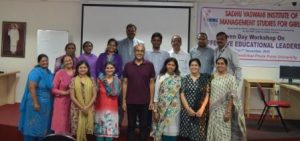
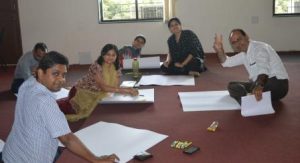
Mr. Dharmendra Rai, Mind Map Trainer and coach ,began the day with a small exercise on memory and creativity to bring out the concept of mind maps . A mind map is a powerful graphical technique which provides a universal key to unlock the potential of the brain and can be applied to every aspect of life. The various activities conducted during the session helped the participants to understand how persons differ significantly in their thought processes. Mr. Rai showed how this tool has been an effective medium for enhancing the performances in the corporate world and simulation of the same in the classroom can improve the memory and develop logical thinking amongst students.
Day 7- TQM and Value Education
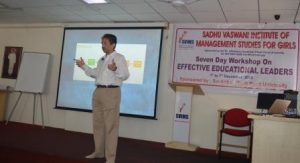
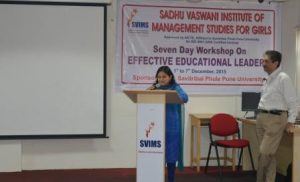
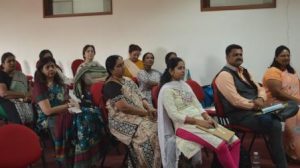
Mr. Anil Gupte, Founder Layer3 Media, introduced Total Quality Management to the participants and showed how it can be extended in the classrooms. TQM is not just an individual or departmental function but is an organisational function. TQM can be achieved in an educational organization by focusing on customers, better leadership, strong internal systems and better processes.
Swami Siddeshananda from Chinmaya Mission conducted a session on Value Education. Acknowledging that he could reach thousands of students through the faculty members attending the programme, he explained the importance of values in life and how teachers should translate values into actions which would be the best way to impart value based education to students.
15th and 16th September 2014
Resource Person: Mr. Clifford de Silva
Mentoring
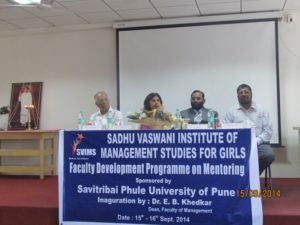
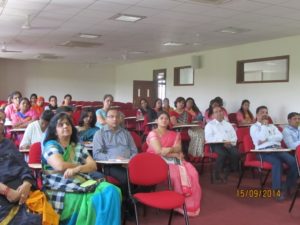
The FDP was inaugurated at the hands of Dr. E.B. Khedkar, Dean, Faculty of Management at Pune University and Director, D Y Patil School of Management, Pune and was attended by over 45 teachers from 12 city colleges.
It was conducted by Mr. Clifford de Silva, eminent trainer’s trainer and Director, Goa Institute of Counselling, Mr. De Silva, has conducted workshops on diverse topics such as Person Centred Therapy, Ericksonian Conversational Hypnosis, Neuro-Linguistic Programming, Hypnotherapy and a host of other programmes in many cities in India as well as Bangkok, Thailand and in Ho Chi Minh, Vietnam. The session began with a self-awareness exercise that propelled individuals to examine their attitude, thoughts, behaviour and communicative skills. He offered definite guidelines to generate new behaviour patterns and overcome addictions and unwanted habits. The workshop was highly interactive, with articulate participation and spirited discussions in every session. The workshop not only gave sound theoretical inputs to participants on the need for mentoring in today’s context; it also helped the participants to formulate a mentoring plan for their institution and an action plan to implement it effectively.
Dr. B.H. Nanwani, Director, SVIMS, said that the role of a teacher has become far more challenging and complex today. While stress is fast becoming a killer disease among the youth, one-third of all suicides worldwide are said to be reported from India. There is increasing pressure on the students to perform beyond expectations in a highly competitive environment. The teacher therefore needs to be much more than an instructor. This is one of the reasons why SVIMS has chosen to make Mentoring the subject of an FDP, she added.
Prof. Prakash Chaudhary, Vice Principal, Ness Wadia College observed: “Dealing with youth today requires that teachers receive inputs through a scientific training programme from an experienced and qualified counsellor. I am glad that SVIMS has taken this initiative, and I have personally benefited from this programme. I only wish that other institutions would follow their example. Such FDPs are the need of the hour for the teaching community.”
Ms. Hazel Francis and Simone Samuel, freelance trainers, said that the workshop would equip them better to handle their own trainees who invariably looked upon them as mentors. “It made all the difference to be part of the audience and learn from a master trainer,” Ms. Hazel Francis added. Prof. Purnima Kulkarni of St. Mira’s College said: “Mr. De Silva’s tips on mentoring were invaluable… the two-day programme has left an indelible impression on my mind…I can see a drastic change in myself, a very positive one at that!” Trainee teachers and Nursing Staff also attended the programme and felt it was a wonderful learning experience.
13th February 2014
Resource Person: Dr. Raj Agrawal
No. of Participants – 26 (15 from other institutions)
Case Writing and Identification of Research Problems
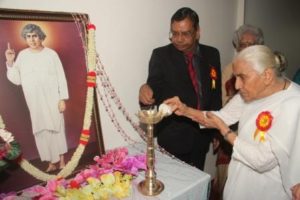
The FDP on Case Writing and Identification of Research Problems came as a critical link to bridge the gap that exists for many Faculty Members between teaching and research. The resource person Dr. Raj Agrawal –Director AIMA started the session with a brief introduction of different objectives of writing case studies. The focus of the session however was on case studies for teaching/academic purposes. Important aspects to be considered prior to writing a case were also discussed followed by key issues in writing a case paper and finally arriving at a general structure for a case study. Dr. Agrawal stressed upon the fact that a research problem can have multiple dimensions. To ensure the learning objectives are met and the case is interesting for the students, the faculty has to restrict narration and discussion to the concepts under consideration.
The post lunch session dealt with identification of a research problem. Dr. Agrawal shared insights from his experience as a researcher. This was followed by a group activity of identifying research problems by participants. It was a very interactive session. Each group got an opportunity to identify and present their research problem while the facilitator and other participants critically analyzed the same. The feedback received for the programme was positive.

